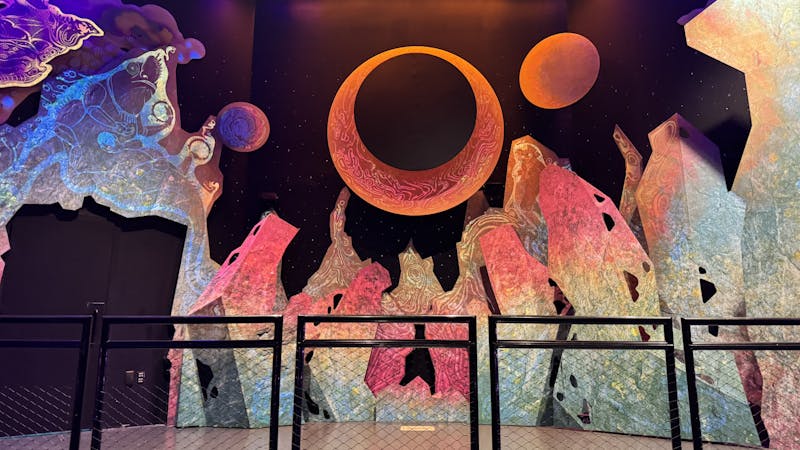Review: ‘The Boy and the Heron’ takes animation to new heights

Courtesy Studio Ghibli
Score: ★★★★½
Perhaps the biggest flaw with “The Boy and the Heron” is its title, or at least, the title presented to Western audiences. The name inspires an image of the drab, hackneyed animated parable, an image that stands opposite to the sheer visual spectacle and thematic scope found within the film.
The original Japanese title, which roughly translates to “How Do You Live?” is much more appropriate. In his 12th animated feature, Hayao Miyazaki constructs and explores a gorgeous, innovative fantasyland with the intent to answer or at least meaningfully acknowledge this nebulous yet ubiquitous question. Through his trademark visual ingenuity and intensely personal flourishes, Miyazaki manages to resolve this titular question by showing the audience how he has led his life, acknowledging his shortcomings and revealing an intense, empathic bittersweetness that beautifully reflects the human condition.
This concept immediately inspires skepticism; taking aim at life itself is a near-insurmountable task. To reach the self-prescribed conceptual summit, Miyazaki starts with his own life. The film follows Mahito, a boy who loses his mother in a hospital fire during World War II. Following this death, Mahito moves with his father to the countryside to live with his new stepmother. This setup is intentionally reminiscent of Miyazaki’s own life, as he grew up surrounded by the aftermath of the Second World War. The level of detail within the grounded segments of the film feels appropriately visceral — the strife communicated in these moments feels incredibly genuine and reflective on the part of the director.
As Mahito adjusts to his new home, he is taunted by a gray heron who eventually leads him to a sealed tower. After his stepmother disappears, Mahito enters the tower to rescue her and discovers an entire world seemingly parallel to his own, inhabited by fantastical creatures and stunning landscapes. The audience is whisked away as Mahito is, forced to grapple with the new environment as he is. To explain each of these environments and creatures would be a disservice to the film itself — the animation on display is complex and thoroughly constructed. Each new environment feels richly lived in, and as Mahito explores the parallel world, Miyazaki’s vision crystalizes. The challenges Mahito faces are intentional, allowing Miyazaki to demonstrate his fears and philosophies, which in turn, allows him to answer the question posed in the original Japanese title. What makes the film relatable (or even decipherable) is that these moments are rendered in universally understandable terms.
If it is near impossible to not be moved by the sheer magnitude of the visuals and story, Joe Hisaishi’s score makes it completely impossible. The orchestration accentuates the highs and lows of the story wonderfully, but never fully resolves itself, just as life never never fully reveals itself. Despite this overwhelming achievement, I did feel that the film briefly lost me before the conclusion. In a film so jam-packed with creative creature designs and detailed locations, the decision to stop introducing new ideas gave me whiplash. I wanted Miyazaki to stretch the visual identity of the film even further to match the high point on which it concludes.
Ultimately, though, it is only a good thing if a film leaves you wanting more. And while the film may have had room for even more imagination, the thematic resolution provided is deeply satisfying and personal. “The Boy and the Heron” effectively pushes the limits of filmmaking to provide a glimpse into the life of one of animation’s most acclaimed filmmakers, a glimpse that inspires intense reflection and emotion on the part of his audience.
More from The Rice Thresher

Thresher’s guide to arts and entertainment in Houston
New to the city? Unsure how to spend your time procrastinating on homework? You’re in luck — Houston is a playground if you know where to look, and most of it is an easy metro ride or short commute from campus. Here’s a starter pack of spots that deliver fresh air, brain food and the occasional “wait, this is in Houston?” moment.

Thresher’s Lollapalooza report: Who ruled Grant Park?
Chicago’s Grant Park ran on pure dopamine this weekend — surprise debuts, late-but-worth-it arrivals, confetti, fireworks and at least three mass sing-alongs an hour. From Joey Valence & BRAE road-testing new indietronica to A$AP Rocky cracking open his vault, T-Pain turning the field into karaoke and Olivia Rodrigo summoning Weezer, Lollapalooza felt like a live-wire mixtape. Doechii built a universe, TWICE made history and Sabrina signed off with a superstar-cementing finale. Here’s what actually lived up to the skyline.
“Ginny & Georgia” Season 3: A Messy, Magnetic Villain Origin Story
I’ll admit it: I came into “Ginny & Georgia” expecting another glossy Netflix soap that looks great in a weekend binge but evaporates from memory by Monday. By the end of season three, I realized I’d been doing something I rarely do with shows like this: I was taking notes. Not on the plot (though it’s as twisty and outrageous as ever), but on the characters. I loved them. I was grinning from ear to ear watching them scheme, stumble and monologue their way through impossible situations. That’s when I knew: this show had done something right.


Please note All comments are eligible for publication by The Rice Thresher.